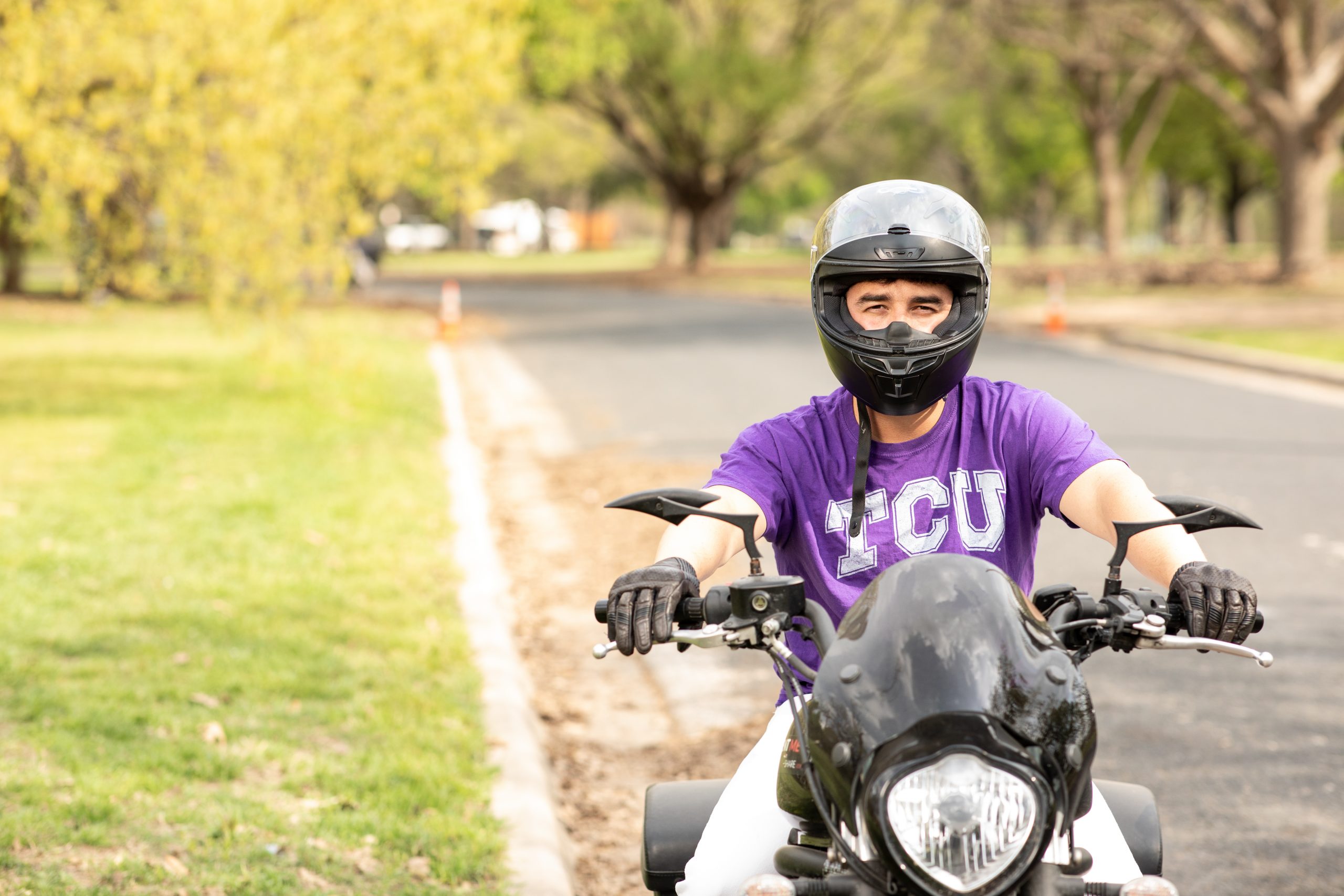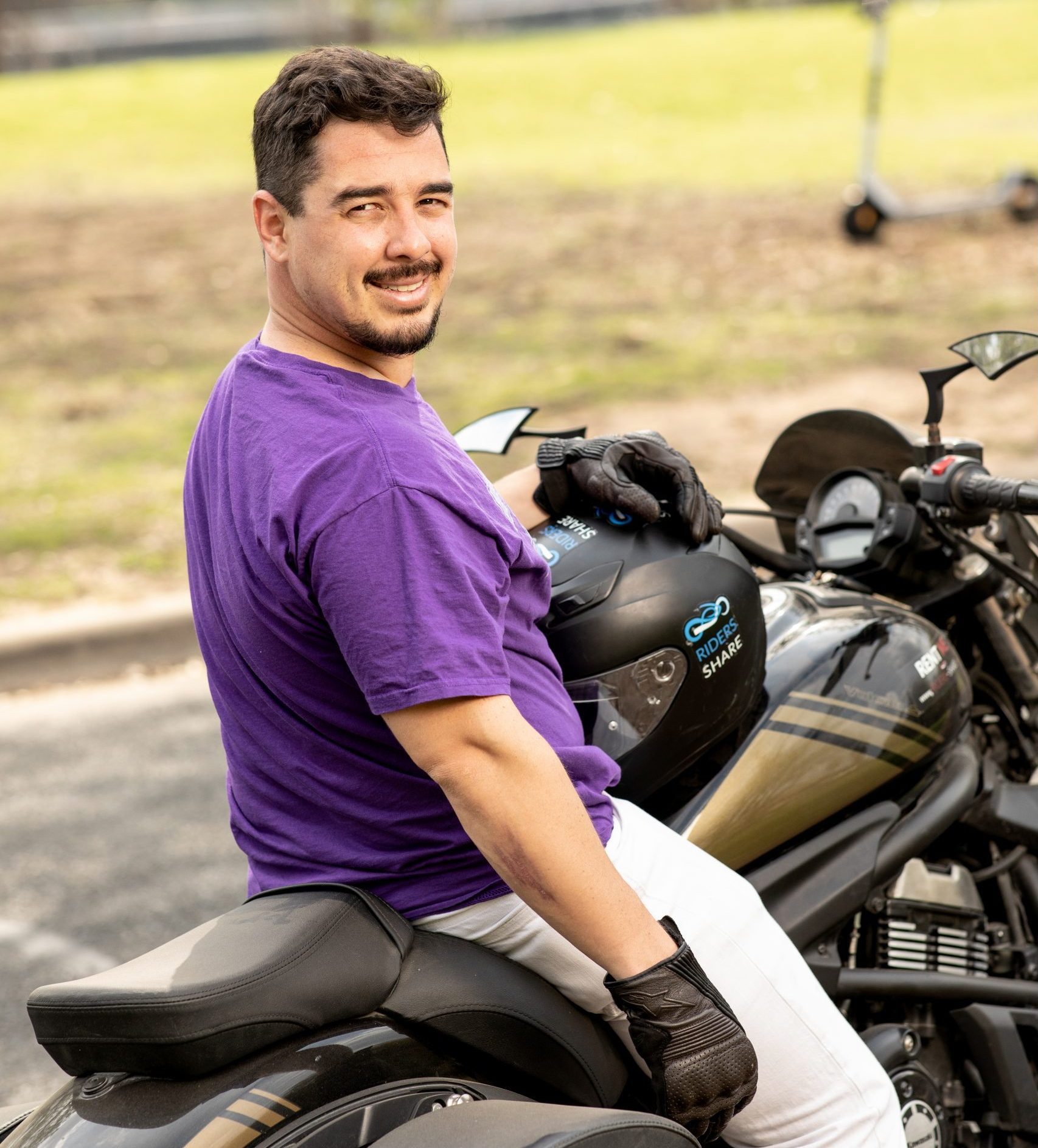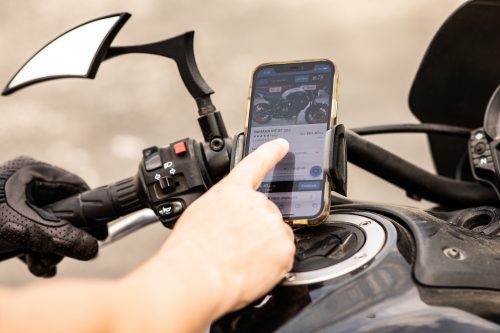A Winding Road to Success
Guillermo Cornejo navigates entrepreneurial ups and downs with his motorcycle-rental Riders Share.

Guillermo Cornejo is the founder and CEO of Riders Share, the world's largest peer-to-peer motorcycle rental platform. Photo by Kirk Weddle
A Winding Road to Success
Guillermo Cornejo navigates entrepreneurial ups and downs with his motorcycle-rental Riders Share.
Guillermo Cornejo ’10 characterizes his post-TCU journey as an eventful, challenging ride. While working in the automotive industry, he created — and later nearly lost control of — Riders Share, a peer-to-peer motorcycle rental marketplace akin to Airbnb and the car-sharing Turo.
Cornejo’s 5-year-old venture boasts more than 3,000 bike listings around the country and 250,000 registered renters. Forbes and the Los Angeles Times have written it up, institutional investors put in more than $4 million, and the business continues to grow exponentially — from $4.4 million in rentals in 2021 to $7.1 million in 2022.
Dreaming Big
Cornejo graduated from high school at 17, like many Peruvians, and followed his older sister to TCU, where he was later joined by his younger brother. An honors student, he double-majored in economics and political science.
When Cornejo met corporate recruiters during his senior year, the economy was still impacted by the 2008-09 recession. He credited an econometrics course taught by professor Kiril Tochkov with helping him get hired as a strategy analyst for Nissan Motor Acceptance Corp. — and with aiding his advancement there and later at General Motors Financial and Hyundai Capital America. In the class, he learned how statistical and mathematical theories can help forecast future trends.
“Nissan hired me because I had taken that class. For them, it was like hiring a statistician at half the cost,” Cornejo said. “And that’s how I got into the auto industry — even though I had never driven a car before.” (While Cornejo couldn’t afford a car as a student, the job prompted him to get a vehicle for commuting from Fort Worth to Irving.)
“Econometrics taught me how to create statistical models. Multivariate linear and logistic models are simple enough for business applications such as forecasting vehicle values but also understanding the impact of repairing a bumper on a used vehicle, for example.
“I’ve worked side by side with people with master’s degrees or PhDs. … I knew enough to understand their models and could call them out when something was wrong. Many focused on using sophisticated tools as opposed to understanding the business. I got promoted by building very simple statistical models. We didn’t need a model with 50 variables that we cannot possibly understand.”

Guillermo Cornejo grew his business, Riders Share, in California, but the company moved back to Texas in 2020. Photo by Kirk Weddle.
Business Adventures
The entrepreneurial bug bit early in his career. While Cornejo was working in auto finance, he decided to import chicha morada, an Andean antioxidant drink made from purple corn. Peruvians lace it heavily with sugar, but Cornejo thought that by reducing the sweetness he could market it as a health drink. It didn’t catch on; friends thought it tasted too much like Kool-Aid.
His epiphany about a peer-to-peer bike rental marketplace came after crashing his motorcycle.
“I was 23 and had only been riding a motorcycle for two months. [I was] going as fast as that little bike could go. … There was a curve, and I just fell and rolled like 20 feet. Luckily I didn’t hit anything, so I survived. I only broke my hand.”
While recovering, Cornejo thought about how he rarely used his motorcycle to commute because he’d arrive at work sweaty. “I mainly rode on weekends for fun,” he said. “So I thought, I use it only like 10 times a year (and) if I rented, I could still experience a motorcycle.”
He made a call and was told a rental was $200 a day — far more than for a car. He researched the market and found that rental companies charged higher prices in summer to offset the slow winter season. Cornejo had read articles about Turo, the peer-to-peer car rental service, and RVshare.

Riders Share started to take off once Guillermo Cornejo hired a coding expert to build a new website. Photo by Kirk Weddle
“Motorcycles were like the only space missing,” he said. Since the bikes would be owned by private parties, his venture would not have to invest heavily in inventory or deal with costs like depreciation — “another concept that I learned in economics,” he said.
Friends told him no one would rent out their precious motorcycles. But Cornejo believed the concept would work. “You tell them they can make $100 a day renting their motorcycle and doing no work,” he said. “Sure enough, acquiring supply hasn’t been that difficult.”
In January 2015, Cornejo took a job as an analyst with Hyundai specifically to move to Los Angeles, the biggest motorcycle rental market. He then received a full scholarship to the University of California, Los Angeles’ MBA program and won a prize for his peer-to-peer rental business plan. He juggled his job, his studies and his startup.
The first version of Riders Share struggled because of a subpar website, which Cornejo shut down in order to regroup. He cycled through several prospective technical co-founders until he approached website coding expert Brendon Lamb, who agreed to work for an equity stake.
“What I brought was the ability to manage risk and insurance. I just needed someone to build a website,” Cornejo said. “He took six months to rebuild it from scratch. We launched in February 2018. … It worked. It did what we needed it to do.”
Like Airbnb hosts, some bike owners who rent out their motorcycles can make good money. “I’ve got a couple of hosts with 20 to 30 motorcycles that make $100,000 a year each,” Cornejo said. He rents out his own Kawasaki through Riders Share; the proceeds cover his loan payments.
David Steakley, managing director of the Houston-based Texas Halo Fund, which invests in early-stage businesses, has rented out his Harley on Riders Share since 2018. He was so impressed with Cornejo that his fund took a stake in the peer-to-peer marketplace, investing $300,000.
“The thing that has always impressed about Guillermo is that he’s extremely analytical,” Steakley said. “Growth is the whole game. Economies of scale and the cost of marketing are absolutely life and death in making it work. Guillermo has good margins. The key factor is his ability to grow his supply of motorcycles.”
Austin-based LiveOak Venture Partners raised more than $1.5 million, prompting Riders Share and Cornejo to relocate to the Texas capital in March 2020, less than a year after he completed his MBA. With the financial backing came support and advice, but also strings attached.
Cornejo’s equity dropped to 20 percent, and the board brought in a candidate to replace him as CEO in order to grow the company faster. Cornejo said he was relieved when the candidate, a former head of business development at Uber, interviewed the venture’s top 30 customers and every employee before talking himself out of a job by saying no leadership change was needed — just more capital.
Bumps in the Road
Early in the Covid-19 pandemic, Cornejo said, risk-averse riders stayed home and reckless ones rented, causing crashes to soar. There were fraudsters who set up fake accounts. Then, he said, a marketing firm burned through $60,000 without approval.
“I had no idea how difficult it would be to run this company when I started or I would probably have picked an easier business model. But, hey, you know what? We’re very close to blowing up, to being profitable.”
Guillermo Cornejo, founder and CEO of Riders Share
Insurance was a major challenge, too. At its start, Riders Share lost $100 per rental because of insurance costs. Cornejo was able to cut the loss in half by negotiating a new policy, and ultimately saved much more by offering damage coverage through Riders Share.
“I had no idea how difficult it would be to run this company when I started or I would probably have picked an easier business model,” Cornejo said. “But, hey, you know what? We’re very close to blowing up, to being profitable.”
Neeley School of Business’ Michael Sherrod, an instructor and the William M. Dickey Entrepreneur in Residence, said that becoming profitable five to six years after launching would put Cornejo ahead of schedule.
“Most venture capital-backed companies — the average is around 10 years for them to be sold, become profitable or go out of business,” Sherrod said. “He’s matching people who need one with people who have one. That two-sided marketplace is very powerful if you can get it up and running. … Investors love nothing more than pouring more money into a fire that’s going well.”
Cornejo said that Riders Share will reach profitability with increased marketing, underwritten by a crowdfunding campaign that raised more than $250,000 in three months in early 2023. “$500,000 would allow us to be profitable enough not to need to raise capital ever again,” he said, adding that his team aims to grow the company to $15 million-$20 million in rentals in 2024.
“When you are self-sustaining as a company, and you no longer need to sell equity, that means a lot to the entrepreneur because it means he gets to keep more of the company,” Sherrod said, “and it means a lot to investors because it means at some point, if it’s a successful marketplace, you’ll probably be able to sell it for a big multiple.”
Farid Brad Mozaffari of San Diego has rented motorcycles through Riders Share more than a dozen times. “You put in a ZIP code and it tells you what motorcycles are available. Then you book your ride and they deliver it to you,” said the plastic surgeon. “This way, I don’t have a motorcycle collecting dust and ridden just once a month.”
Many of those rented bikes belong to Daniel Roizen, a San Diego entrepreneur who has done more than 400 rentals since 2020. Some have been returned damaged — even totaled — but Cornejo’s venture handled the claims seamlessly, Roizen said. “I’ve rented to lawyers, politicians, police officers, a rapper and even a woman who said she needed a bike for a photo shoot.”
Riders Share now has six employees, including technical co-founder Lamb. Cornejo said his years in the auto industry played a role in building his business.
“My experience helped a lot, particularly around the risk management of the insurance component, but also in pricing, planning, fundraising,” Cornejo said. “Experience is underrated in entrepreneurship.”

Your comments are welcome
Comments
Related Reading:
Alumni
Handling With Care
Patients’ safety comes first for Baylor Scott & White’s Lisa Havens.
Alumni
Alumni Chapter: Kansas City
This is the third in a series of visits with regional TCU alumni chapters and clubs.